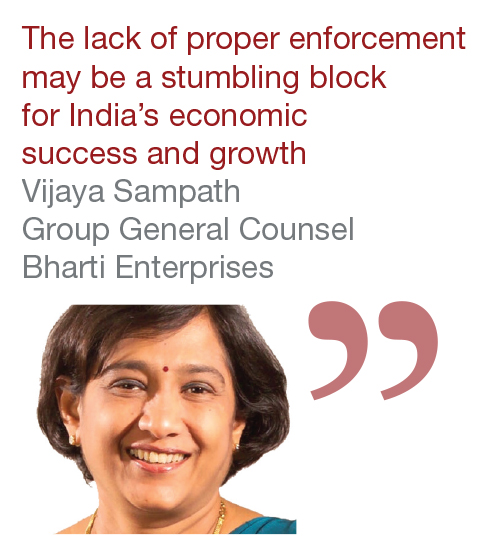The ease of evading inconvenient court orders, laws and regulations threatens to undermine India’s economic growth. The time for reform is ripe. Ben Frumin reports
Vikram Nankani’s client had what seemed to be a straightforward deal – to sell another company a significant amount of material used in the steel and cement industry. When the buyer backed out for what Nankani’s client believed was a bogus reason, the parties found themselves in arbitration.
Nankani, a partner at Economic Laws Practice in Mumbai, thought he had “a very simple, straightforward case of breach of contract”. The three-member arbitration tribunal seemed to agree, awarding his client around US$1 million.
Then came the hard part: enforcement. The buyer appealed and a district judge threw out the award over an alleged procedural miscue, saying Nankani’s side had dropped two witnesses after filing affidavits. “Groundless, preposterous,” Nankani responds, calling the decision “totally alien and foreign to the award or the merits” of the case.
The issue has yet to be resolved. While the arbitration was completed in just 10 months, the matter has since spent five years languishing in the courts. “It’s really frustrating,” Nankani laments. “And there’s nothing that can be done.”
Nankani’s story illustrates an ongoing trend that is both troubling and frustrating for many lawyers: lax and inconsistent enforcement of laws, judgments, regulations and awards. No matter the sector – intellectual property rights, financial regulation, arbital awards, taxation – the refrain is the same: India’s enforcement regime needs urgent reform.
“India has a plethora of laws covering almost every sector,” says Anindita Roy Chowdhury, an associate at LexCounsel. “But unfortunately, it is the enforcement of these laws that is severely lacking and rather challenging.”
That means trouble for clients who “find uncertainty more frustrating than a rigid set of rules – or no rules at all,” says Eliab Erulkar, a partner at Baker & McKenzie in New York.
“Very often you’ll get a judgment for payment of a sum of money,” says Clifford Chance partner Martin Rogers. “But if the defendant doesn’t pay up, what do you do?”
The paucity of options is a major problem for India. “Unless there is a change in the mindset and attitude, the lack of proper enforcement may be a stumbling block for India’s economic success and growth,” says Vijaya Sampath, group general counsel and company secretary at Bharti Enterprises.
Systemic problems
Enforcement is a particular problem in criminal proceedings and contracts, says Trilegal partner Anand Prasad. Rogers adds that enforcing an international decision is a “nightmare”.
Enforcing intellectual property rights (IPR) can also be a headache. “Weak intellectual property enforcement is a major barrier to increased trade,” says Ajit Warrier, a partner at Luthra & Luthra. “This is unfortunately the case with IPR enforcement in most developing countries, including India.”
One of the major problems in enforcing patent rights, Warrier says, “is the acute lack of awareness of patent basics in the judiciary and even the legal fraternity. Moreover, there is no criminal remedy available for the infringement of patents. This often leads to insufficient remedy in the infringement suits.”
For the most part, India’s laws and regulations are satisfactory. It’s enforcement that’s the problem. Many of the country’s worst enforcement problems stem from massive backlogs in the courts and antiquated administrative procedures that are easily exploited by those seeking to derail the enforcement process.
You must be a
subscribersubscribersubscribersubscriber
to read this content, please
subscribesubscribesubscribesubscribe
today.
For group subscribers, please click here to access.
Interested in group subscription? Please contact us.
你需要登录去解锁本文内容。欢迎注册账号。如果想阅读月刊所有文章,欢迎成为我们的订阅会员成为我们的订阅会员。
The chance of a lifetime
Manmohan Singh’s decisive election victory gives his Congress-led coalition a unique opportunity to tackle enforcement failures head on
Many lawyers believe the time is ripe for the Indian government to take the lead in reforming the country’s enforcement regime – especially given its decisive general election victory and the opportunities presented by the reshaping of the global economy.
“The government needs to implement administrative, judicial and labour reforms on an urgent basis and needs to take steps to further liberalize the Indian economy,” says Anand Prasad, a partner at Trilegal. “The clear mandate secured by the government makes it easier to provide special focus on implementation issues.”
“A decisive mandate for the incumbent government in the 2009 general election may lead to more reforms in the legal sector as well as in the judiciary,” agrees Sanjeev Kapoor, a partner at Khaitan & Co.
Others take heart from comparing India’s current position to where it was decades ago. “There has been unbelievable progress in many sectors and in its own unique way India has met its challenges. The trick is to allow India and Indians to do it at their own pace – slow enforcement should not be misinterpreted as lax or no enforcement,” observes Shabbir S Wakhariya, a partner at Kelley Drye & Warren. “The world may move faster than India – but the past two years have shown that India is steadier than the rest of the world.”
Wakhariya continues “The recent election results have presented India with a unique opportunity to accelerate reforms, enforcement of laws and regulations and growth. I am sure it will do it.”
Others aren’t quite so optimistic. Is there an opportunity for government action on enforcement on the horizon? “Highly unlikely,” says Sonali Sharma, a partner at Juris Corp.
“It’s not at the top of the list of things to do,” Clifford Chance partner Martin Rogers adds, “but it’s in the list, and there is a reasonable prospect that a government with a solid majority is going to push it through.”
That seems to be the general belief, cautious though it may be. Change, it’s hoped, is coming.
“There is a great opportunity for action toward better enforcement, and in establishing the credibility of the legal system, much can be done,” says Vijaya Sampath, group general counsel and company secretary for Bharti. “It is early days yet, but there is hope that the future will bring with it modern practices, thinking and action in tune with global trends.
“India is taking huge strides to ensure that it emerges from its ‘emerging economy’ status to take its rightful place as a superpower, but for this a cleaner, efficient and faster legal system is critical for success,” Sampath adds.
Anindita Roy Chowdhury of LexCounsel points to the Indian government’s 2009-2010 budget as a sign of things to come, saying that Rs4.3 billion will be spent to modernize police machinery, along with a proposed law forcing judges to disclose their personal wealth. “Even though these are small measures,” she says, “they may go a long way in creating robust law- enforcement bodies.”
[/ihc-hide-content]




























